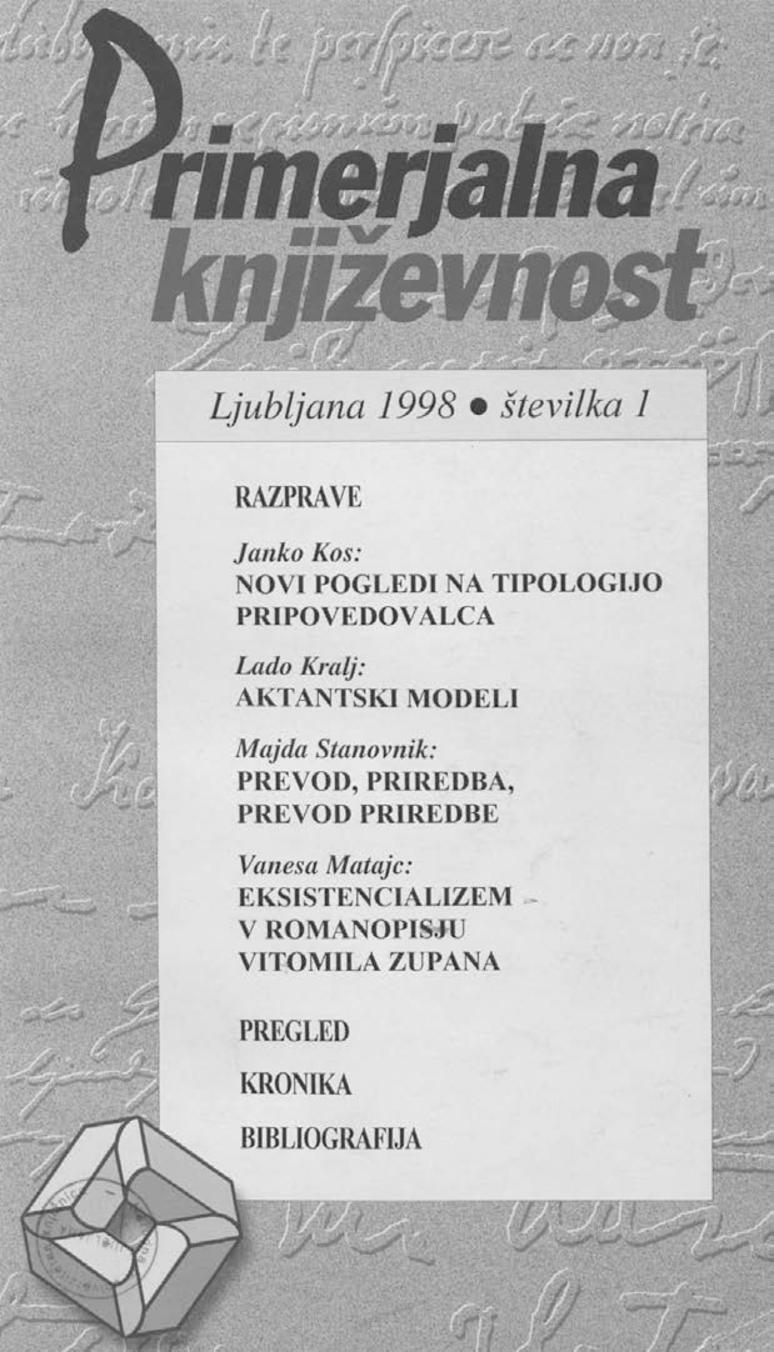Existentialism in the Novels of Vitomil Zupan
Keywords:
Slovene literature, literary movements, existentialism, Zupan, Vitomil, Geistesgeschichte, literature and philosophy, French existentialism, Sartre, Jean-Paul, Camus, AlbertAbstract
The fundamental pattern of Zupan’s novel heroes is transposed to oscillating, varied derivations or the consequences of metaphysical nihilism as the basis of different positions for the subject in his novels: he derives it from neoromanticism, decadence and post-naturalism. The influence of social realism can be found since Klement (most developed in Človek letnih časov, The Human of Seasons). Sometimes he employs the formal stylistic means of modernism (especially in Menuet, Minuet, and Apokalipsa, Apocalypse), although “strong, vital, romantic subjectivity” limits a possibly fuller development of both modernist and existentialist elements. Zupan actually also starts from existentialist themes, sometimes he even allows the temporary dominance of the truth of the absurd; because of his vitality, however, he cannot accept absurdity as the final solution. In an action-charged treatment of the will as the power of cognition, he firmly believes in a real, though still undiscovered truth of the human passion for life, which would surpass the absurd road to nothingness. The paradigmatic scheme of Zupan’s opus therefore seems to lie in Menuet za kitaro (Minuet for Guitar), with the symbolism of human life as a walking in circles: from pure passion for life, which is formed with the will to power as the will to freedom and cognition, to a temporary recognition of the absurd consignment to nothing, it then follows to the heroic pessimism of a novel of human fate, another victory of vitality, etc. This walking in circles is an explanation of the blockade of existentialism in Zupan’s opus. Occasionally, (and probably even more, following the examples of Malraux’s La Voie Royal or Celine) he recognizes the self-blockade or auto-destructiveness of Nietzschean acts of will to power; but this is an exception rather than a rule, evident especially in Klement, Apokalipsa (Apocalypse) and the play Aleksander praznih rok (Alexander Empty Handed). Most often, however, derivations of the will to power quite unproblematically predominate since they confirm Zupan’s “inborn” optimistic vitality.References
Agrégés de Lettres modernes. XXe siècle. (Ur. C. Biet, J.-P. Brighelli, J.-L. Rispail.) Pariz: Editions Magnard 1987. (Collection Textes et Contextes)
ANDRÉ, Alain, Nony, Danièle: Littérature française. Histoire et Anthologie. Pariz: Hatier 1987.
Anthologie de la littérature française : XXe siècle. (Ur. C. Florentin, Y. Guetz, J. Prin, J.-P. Santerre.) Pariz: Larousse 1989. (Classiques Larousse)
BERGER, Aleš (ur.): Vitomil Zupan. Interpretacije 3. Ljubljana: Nova revija 1993.
BRUNEL, Pierre (ur.): Histoire de la littérature française. XIXe et XXe siècle. Nancy: Bordas 1986.
DŽAKULA, Branko (ur.): Francuska književnost III/2 (1933–1970). Sarajevo–Beograd: Svjetlost–Nolit 1982. (Edicija Strane književnosti)
GRIMM, Jürgen (ur.): Franzözische Literaturgeschichte. Stuttgart: J. B. Metzler Verlag 1989.
HERMAND, Jost (ur.): Neues Handbuch der Literaturwissenschaft. Band 21: Literatur nach 1945. I: Politische und regionale Aspekte. Wiesbaden: Akademische Verlaggesellschaft Athenaion 1979.
INKRET, Andrej: Spomini na branje. Maribor: Obzorja 1977.
INKRET, Andrej: Novi spomini na branje. Ljubljana: Mladinska knjiga 1980.
KERMAUNER, Taras: »Ironično potovanje zaigranega človeka.« Spremna beseda k: Vitomil Zupan: Potovanje na konec pomladi. Ljubljana: Cankarjeva založba 1972.
KERMAUNER, Taras: Družbena razveza. Sociološko in etično naravnani eseji o povojni slovenski prozi. Ljubljana: Cankarjeva založba 1982.
KORON, Alenka: »Nemirno iskanje moderne proze: Zupanovo pripovedništvo do Menueta za kitaro.« V: Berger, A. (ur.): Vitomil Zupan. Interpretacije 3. Ljubljana: Nova revija 1993.
KOS, Janko: »Albert Camus in filozofija absurda.« Spremna študija k: A. Camus: Tujec, Kuga. Ljubljana: Cankarjeva založba 1986 (2. izd.). (Sto romanov)
KOS, Janko: »Pripombe k slovenskemu kulturnemu razvoju 1945–1980, VI: Eksistencializmi in eksistencialisti na Slovenskem.« Sodobnost 11, Ljubljana 1993 (str. 988–1009).
KOS, Janko: Na poti v postmoderno. Ljubljana: Literarno-umetniško društvo Literatura 1995. (Novi pristopi)
LITTÉRATURE. Textes et Documents. XXe siècle. (Ur. B. Lacherbounier, D. Rincé, P. Brunel idr.) Pariz: Nathan 1992. (Collection Henri Mitterand)
MADŽAREVIČ, Branko: »Célinov nori ples besed ali potovanje v tišino resnice.« Spremna študija k: Louis-Ferdinand Céline: Potovanje na konec noči. Ljubljana: Cankarjeva založba 1976. (Sto romanov)
PATERNU, Boris: Razpotja slovenske proze. Novo mesto: Dolenjska založba 1993. (Seidlova zbirka 8)
PIBERNIK, France: Čas romana. Pogovori s slovenskimi pisatelji. Ljubljana: Cankarjeva založba 1983.
PIRJEVEC, Dušan: »Smrt in akcija.« Spremna študija k: André Malraux: Kraljevska pot. Ljubljana: Cankarjeva založba 1987 (2. izd.). (Sto romanov)
POGAČNIK, Jože: Zgodovina slovenskega slovstva VIII: Eksistencializem in strukturalizem. Maribor: Obzorja 1972.
RODRIQUES, Jean-Marc: Histoire de la littérature française : XXe siècle. Tome I : 1882–1944. Pariz: Bordas 1988.
VASIČ, Marjeta: Eksistencializem in literatura. Ljubljana: DZS 1984. (Literarni leksikon 24)


